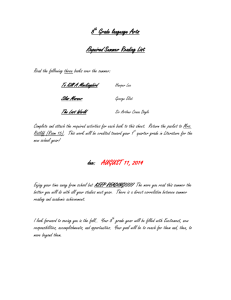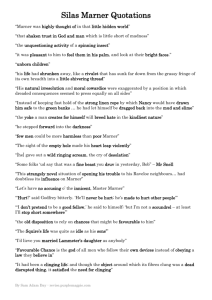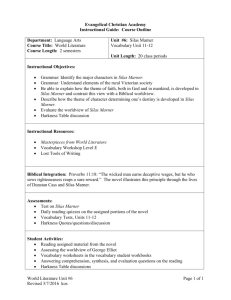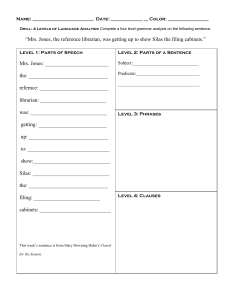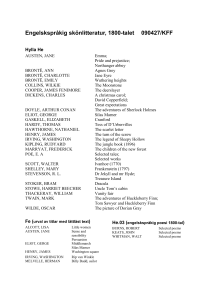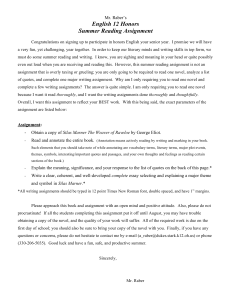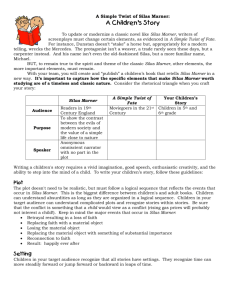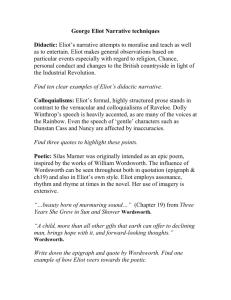Silas Marner and the Anonymous Heroism of Parenthood
advertisement
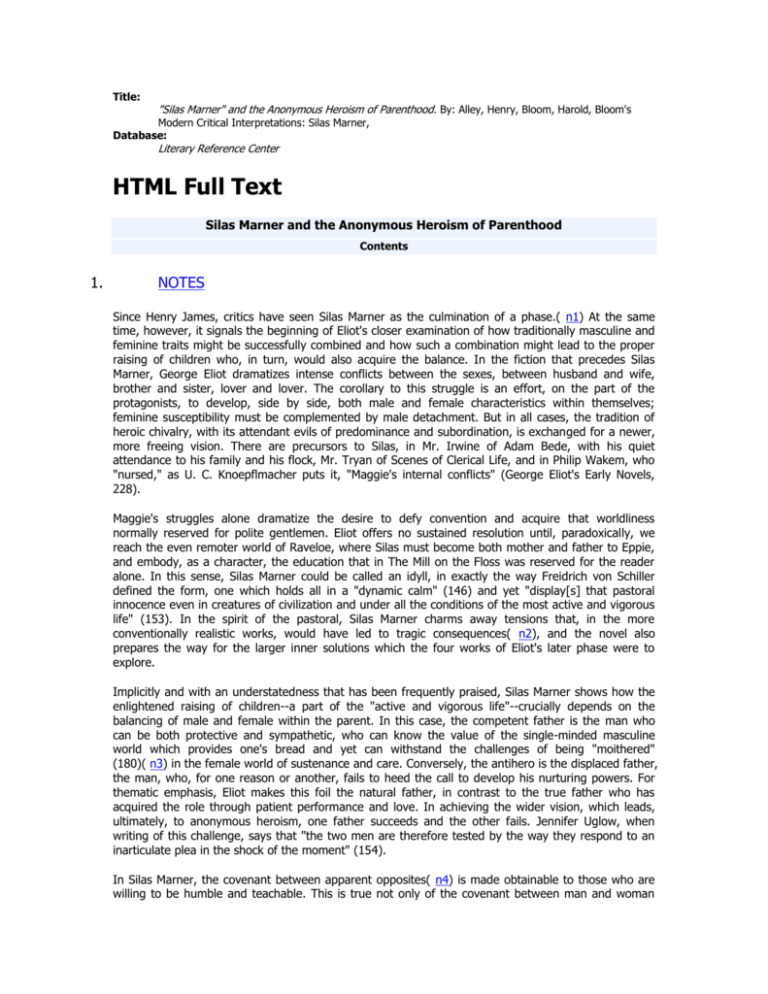
Title: "Silas Marner" and the Anonymous Heroism of Parenthood. By: Alley, Henry, Bloom, Harold, Bloom's Modern Critical Interpretations: Silas Marner, Database: Literary Reference Center HTML Full Text Silas Marner and the Anonymous Heroism of Parenthood Contents 1. NOTES Since Henry James, critics have seen Silas Marner as the culmination of a phase.( n1) At the same time, however, it signals the beginning of Eliot's closer examination of how traditionally masculine and feminine traits might be successfully combined and how such a combination might lead to the proper raising of children who, in turn, would also acquire the balance. In the fiction that precedes Silas Marner, George Eliot dramatizes intense conflicts between the sexes, between husband and wife, brother and sister, lover and lover. The corollary to this struggle is an effort, on the part of the protagonists, to develop, side by side, both male and female characteristics within themselves; feminine susceptibility must be complemented by male detachment. But in all cases, the tradition of heroic chivalry, with its attendant evils of predominance and subordination, is exchanged for a newer, more freeing vision. There are precursors to Silas, in Mr. Irwine of Adam Bede, with his quiet attendance to his family and his flock, Mr. Tryan of Scenes of Clerical Life, and in Philip Wakem, who "nursed," as U. C. Knoepflmacher puts it, "Maggie's internal conflicts" (George Eliot's Early Novels, 228). Maggie's struggles alone dramatize the desire to defy convention and acquire that worldliness normally reserved for polite gentlemen. Eliot offers no sustained resolution until, paradoxically, we reach the even remoter world of Raveloe, where Silas must become both mother and father to Eppie, and embody, as a character, the education that in The Mill on the Floss was reserved for the reader alone. In this sense, Silas Marner could be called an idyll, in exactly the way Freidrich von Schiller defined the form, one which holds all in a "dynamic calm" (146) and yet "display[s] that pastoral innocence even in creatures of civilization and under all the conditions of the most active and vigorous life" (153). In the spirit of the pastoral, Silas Marner charms away tensions that, in the more conventionally realistic works, would have led to tragic consequences( n2), and the novel also prepares the way for the larger inner solutions which the four works of Eliot's later phase were to explore. Implicitly and with an understatedness that has been frequently praised, Silas Marner shows how the enlightened raising of children--a part of the "active and vigorous life"--crucially depends on the balancing of male and female within the parent. In this case, the competent father is the man who can be both protective and sympathetic, who can know the value of the single-minded masculine world which provides one's bread and yet can withstand the challenges of being "moithered" (180)( n3) in the female world of sustenance and care. Conversely, the antihero is the displaced father, the man, who, for one reason or another, fails to heed the call to develop his nurturing powers. For thematic emphasis, Eliot makes this foil the natural father, in contrast to the true father who has acquired the role through patient performance and love. In achieving the wider vision, which leads, ultimately, to anonymous heroism, one father succeeds and the other fails. Jennifer Uglow, when writing of this challenge, says that "the two men are therefore tested by the way they respond to an inarticulate plea in the shock of the moment" (154). In Silas Marner, the covenant between apparent opposites( n4) is made obtainable to those who are willing to be humble and teachable. This is true not only of the covenant between man and woman but also between past and present, individual and society--and the man and woman within the self. The iconographic symbol of Oedipus and Antigone at Colonus, which, as mentioned earlier, perhaps best explains this kind of union, also unites the three-novel sequence of The Mill on the Floss, Silas Marner, and Romola. Each presents a father who loses power and must endure his daughter's guidance--an experience which, paradoxically, strengthens him and makes him a new sort of parent. Such a yielding and such a renewal of energy are critical to our understanding of both the biographical Marian Evans, who saw the nursing of her father as a "worship for mortals" (Letters 1: 284) and the literary George Eliot, who offers an ideal of parental balance. In her novels, it is only through such a symbiosis of dependency and independence that the child herself can grow into power. In writing to Blackwood concerning the proofing of Silas Marner (3: 398), Eliot was particularly vehement about "quite the worst error," a one-letter misprint in Eppie's vehement retort to Godfrey: "And it'd be poor work for me to put on things, and ride in a gig, and sit in a place at church as 'ud make them as I'm fond of think me unfitting company for 'em. What could I care for then?" (234). The printer had put in "them" just before the question mark--which shifted the whole meaning away to the finer "things." What the one letter correction meant was exactly this: if Eppie could not care for the covenant that she and Silas-Aaron-Dolly embodied, she would not have the power to care for anything. While a number of critics have pointed out the balance of male and female as an ideal in the novel, we have yet to see, closely and in a most explicit way, how Eliot introduces the concept of anonymity, as obtained through this bridging of the genders, which is in turn symbolic of Silas's reentry into the community as a whole. At the opening of the novel proper, Silas is seen as traditionally masculine and bound, by work, to his loom. As he grows through the child, however, he learns to see himself as a mother as well and as an anonymous contributor to the world as a whole. Surely this transformation does not occur overnight. Prior to his coming to Raveloe, Silas is presented as a reformulation of Philip Wakem, struggling to preserve a sensibility that is more feminine than masculine. Paralleling the Philip-Tom friendship, Silas's adoration of William Dane (William Waif in the original manuscript) gives way to "strong," "masculine" defensiveness once the initial trust is broken.( n5) It is as though Silas perceived William as the waif who needed both love and worship, and then underwent a kind of dreadful disillusionment of motherhood. Unlike Philip, however, Silas is given time to recover and to recover the lost side of himself. After secluding himself away, Silas learns to trust men once more, once he has discovered that his reputation is less important than his anonymous dedication to what he holds dear. The dramatic metamorphosis occurs through Silas's recollections of his mother and sister. The William Dane crisis, combined with the zeal of Lantern Yard, causes him, initially, to discard his mother's "bequest" (57) of healing herbal knowledge and dedicate his life to the invulnerable loom. When Eppie suddenly appears on his hearth, however, we witness a return to the "remedial"( n6) memories of his mother and what he knew of her in his sister: Could this be his little sister come back to him in a dream--his little sister whom he had carded about in his arms for a year before she died, when he was a small boy without shoes or stockings? (168) Thus, Silas Marner is not simply the story of a withered man whose wounded sensibility is restored through love of a child but the story of an incomplete man, one as incomplete as Philip Wakem or Tom Tulliver, whose female self is reawakened through the raising of a daughter. It is important to note, as David Carroll does (Silas Marner, 153), that Eppie enters through "the chasm in his consciousness" (ch. 12, 167). Thus Silas undergoes a complete loss of self before embracing the female part of himself. This change, symbolized by the catalepsy, shows Silas letting go of his egoistic concerns and welcoming not only Eppie but his little sister, who passed away, and who was the only one, most likely, who appreciated and acknowledged his heroic tenderness. The memory of boyhood returns to Silas with the point that whatever credit he received for his efforts as a brother, came from an unseen Good, one closely linked with Dolly's higher "Them." The two "chasms of consciousness" which preceded this inner revolution have, of course, been the perfect preparation. Silas had to lose his good standing at Lantern Yard as well as his Raveloe treasure trove before he could secure the anonymous heroism which would secure Eppie. Eppie, then, must be named for Silas's mother and sister, since she draws together those memories of womanly care and healing that are to be the wellspring of the life of the present and are to be the models for this special form of parenthood. If Hepzibah means "my delight in her," surely Silas is delighting in the new fullness of his psyche as well as in Eppie herself and in a world no longer connected with trophies and recognition. Once Silas begins attending to Eppie and his mind starts "growing into memory," he also recalls his mother's lore and looks "for the once familiar herbs again" (ch. 14, 185).( n7) The search is made possible also because Silas has given up his own resentment over the Salley Oates incident, an incident that had involved, once again, a concern with reputation and external recognition. With his new goals of motherhood and anonymous heroism, he is able to transcend a sulky disposition and move on to the very thing that symbolizes an enlightened pity and therefore his own regeneration. Jennifer Uglow writes that "they [the herbs] become part of his own healing, knitting together his broken spirit and soothing his wounded memory" (152). Silas's psychic change is heightened, or better, facilitated, by the frequently noted fairytale quality of the Raveloe society. Often in Eliot, modernization can be seen to hasten the tensions between man and woman--as if to move through time were to advance further and further from an Edenic sexual harmony. Thus Raveloe, although remote and out of date, encourages Silas not only in his adoption of Eppie but also in his pursuit of the dual roles that must come with it. We are in an ideal world where the past easily connects with the present and the ways of woman harmonize with the ways of man, even in the halves of a single nature. On the other side of the universe is St. Ogg's, where all exists in division. Maggie cannot connect the world of the fabled past with her present and therefore cannot unite conflicting characteristics within herself. Although Silas makes some of the same errors as Maggie, as well as those of Tom and Philip, redemption arrives for him--and speedily--because in Raveloe, the past is always restorative, and its beating upon the present is readily felt: The thoughts were strange to him now, like old friendships impossible to revive; and yet he had a dreamy feeling that this child was somehow a message come to him from that far-off life: it stirred fibres that had never been moved in Raveloe--old quiverings of tenderness--old impressions of awe at the presentiment of some Power presiding over his life; for him imagination had not yet extricated itself from the sense of mystery in the child's sudden presence, and had formed no conjectures of ordinary natural means by which the event could have been brought about. (ch. 12, 168) Unlike many of Eliot's protagonists, Silas finds the powers of memory to be completely at his disposal as he reenters society. The past returns with ease and leads directly to a sense of rightness and devotion. Just as Raveloe, with its powerful traditions, has no trouble connecting the past with the present, so Silas, in belonging to its charmed context, can reach, almost effortlessly, that part of his personal history which he most requires. As Silas recovers his old affections for his mother and sister, as well as his compassionate religious zeal, he becomes the tender boy "without shoes or stockings" again, and therefore, motherlike, can press Eppie to him "and almost unconsciously [offer] hushing tenderness" (168). He is no longer "himself" because he has lost his identity to a universal parenthood, and because of this change, his anxiety over whether the old "Silas" will survive on his gold disappears. He is on his own way to achieving anonymous heroism because he has embraced a faith in the unseen. The moment of change is altogether convincing since we are in a novel of charmed psychological transformation, where error, though still possible, can be rectified or bypassed at the tight moment. At the same time, however, Silas's growth into a special brand of "motherhood"( n8) does not loosen his hold on the world of masculine work, and it is as if Eliot wishes to emphasize the point that her protagonist stays simultaneously in both worlds. As Gillian Beer writes, "Silas is a weaver, deliberately set across the stereotype of the woman weaving" (126,emphasis hers). The subsequent conflict is small, however, since, in Raveloe, as opposed to St. Ogg's, harmony is also possible between traditionally male and female duties. In doing what is surprising for a man, Silas elicits the sympathy of the community: Silas Marner's determination to keep the "tramp's child" was matter of hardly less surprise and iterated talk in the village than the robbery of his money. That softening of feeling towards him which dated from his misfortune, that merging of suspicion and dislike in a rather contemptuous pity for him as lone and crazy, was now accompanied with a more active sympathy, especially amongst the women. (ch. 14, 178) The mothers' representative is, of course, Dolly Winthrop, but in an important way, she takes Raveloe's eccentricity one step further in denying the supposedly impassable gulf between masculine labor and childrearing. Although some critics might argue that mother figures are conspicuously missing from the novel--and therefore Eliot is once again concentrating solely on the transformed male, while ignoring the psychically balanced woman--Dolly should be seen as a distinct reply. She also is an anonymous hero because she acknowledges the delicacy and the challenge of the tasks facing Silas. Frequently she encourages and often embodies the many strong "masculine" attributes which enable Silas to earn his bread while raising Eppie at the same time. Like Mr. Irwine of Adam Bede, she suggests a heroic perception and breadth of vision which the other characters must quest for until the novel is finished. Thus, it makes sense that she is, in some ways, the commander, advisor, and teacher of the protagonist. In the dialogue of chapter 14, while the difficulties of combining childrearing with the pursuit of one's trade are always acknowledged, compromises are found: the rather alarming prospect of leashing Eppie to the loom so as to keep her from hurting herself is balanced by Dolly's proposal of "my little chair, and some bits o' red rag and things for her to play wi'; an' she'll sit and chatter to 'em as if they was alive" (181). This exchange between Dolly and Silas, along with the solution of prospective conflict in roles, foreshadows, crucially, the novel's ultimate harmonizing of both male and female and also shows a mutual celebration of what no exterior point of view could appreciate. During Silas's subsequent raising of Eppie, the difficult balance between severity and permissiveness, so elusive to the parent is, once again, achievable. Eppie is not spoiled because psychology serves the idyllic laws of the pastoral. Eppie can grow into perfection, even while her doting father lacks the will of the conventional male to discipline her. Because Eppie is loved, with a father's true, balanced love, she can grow into the best of children: Perfect love has a breath of poetry which can exalt the relations of the least-instructed human beings; and this breath of poetry had surrounded Eppie from the time she had followed the bright gleam that had beckoned her to Silas' hearth; so that it is not surprising if, in other things besides her delicate prettiness, she was not quite a common village maiden, but had a touch of refinement and fervour which came from no other teaching than that of tenderly nurtured unvitiated feeling. (ch. 16, 206) Thus, even though "Eppie was reared without punishment" (189), there is to be no ensuing nemesis, as there is in the history of Gwendolen Harleth, since in Raveloe, making the child the center of attention cannot lead to problems. It is poetry that dominates the life of Silas and his adopted daughter. Surely Eliot had this in mind when writing her often-quoted letter concerning the composition of the novel. "I have felt," she wrote, "all through as if the story would have lent itself best to metrical rather than prose fiction, especially in all that relates to the psychology of Silas" (Letters 3: 382). Not only is the psychological transformation of Silas a charmed process, as in a verse romance or idyll, but so are the effects: love, even doting love, is beneficent without qualification. In the "Notes on Form in Art," which was quoted earlier, Eliot speaks of "rhythms & images" forming a "natural history of mind" (435). Here the meter of the changing idyllic landscape lays before us the unique and dynamic process of Silas's male and female mind, as well as its quest toward the anonymous heroism of parenthood. Healing is made visible and believable through a dense imagery and rhythmic sentences that invoke a protected but poetically heightened world--in this case, in a prose context. We will see this again when Eliot adapts another German poet and playwright--Goethe--to the healing medium of the novel Middlemarch. Although Silas's case seems to be the special one, the one reserved for a "legendary" world rather than a realistic one, Eliot is quite consistent in fulfilling Schiller's call for a work that could be idealized and yet apply to the actual world of the reader.( n9) The strategy is multiple; it is achieved first through a series of direct editorial links, between Silas's experience and the experience of "modernday" people; it is achieved, by extension, through the negative example of Godfrey Cass. Also the peculiarity of Silas's case presents a balance. He belongs and yet does not belong, and he is given a variety of suggested identities, with which the reader might possibly identify; he is compared to an artist, a storyteller,( n10) and a scholar. The resulting bridge( n11) means that Raveloe itself has a more realistic presence than, say, Sidney's Arcadia or even Austen's Highbury. David Carroll, in writing of Silas Marner's double nature as both tale and novel, captures again this tenuous balance, saying that "the reader is constantly being reminded that amidst the fictional complexity there is a simple story with its own narrative logic" (George Eliot and the Conflict of Interpretations, 141), so that both magic and narrative explanation of the fictional "reality" are accepted. Silas's example, of course, becomes most applicable to the reader's experience when he tries to become both mother and father to Eppie. By contrast, Godfrey Cass heightens the achievement, when he proves unable to follow his more vulnerable instincts. Unlike Silas, who has distinct memories of a mother and sister to guide him, Godfrey has only "an essentially domestic nature" (ch. 3, 81)--which another family, the Lammeters, must work to save. Thus, at the crucial( n12) moment, Godfrey condemns and isolates himself, making Silas's sympathetic response all the more desirable--much more so than the original scheme proposed by Eliot, the isolated "metrical" treatment, devoid of contrast, would have done. Like Arthur Donnithorne and Adam Bede in his initial phases, Godfrey stands as the rejected heroic model. He has all the trappings of a "big muscular frame" (76), but, consistent with Eliot's sustained irony, he is not yielding enough to rise to the level of true heroism, and he is too concerned with what reputation will bring in order to come close to anything like true parenthood. With the force of a musical recapitulation, chapter 19 holds important links with the opening of the book, dramatizing Silas initially in crisis "when the keenness of the susceptibility makes external stimulus intolerable" (225). Silas then defeats the crisis and defends his right of parenthood in a combined effort to keep his dual sensibility whole and yet counter Godfrey with "a touch of parental fierceness" (231). Godfrey, for his part, clings to his code of proprietorship and represents, quite predictably, the Letter of the Law. It is quite clear that he has started to pursue the title of "father" in a mechanical and conventionally masculine attempt to head off the anonymity of dying without an identified heir. If the child is father to the man, then in Wordsworthian terms, this scene shows Godfrey to be morally illegitimate.( n13) In the heated debate between the father-by-blood and the father-by-love, we expect Silas to be more awkward and less articulate than he is, and we are pleasantly surprised to find the true parent winning even on Godfrey's argumentative territory. The full force of this scene depends partly on the reader's dawning awareness of the extent of Silas's growth. Eppie surprises as well, in her moving reply to Godfrey's offer, showing herself the rightful heir to the transformed Silas, a protector of his anonymous heroism, in full line with the role that Dolly Winthrop has served all along: "And he took care of me and loved me from the first" (234). In making this affirmation directly to her legal father, she proves, more than could any shy country maiden, to be a true integrater also of masculine and feminine ways. Consistent with the power shift that Eliot was careful to assure in correcting the galley proofs, Eppie's "What could I care for then?" prepares the way for her vision of taking care of Silas: "I've always thought of a little home where he'd sit i' the corner, and I should fend and do everything for him" (234). She will become an unrecognized hero as well. Thus, the scene allows the reader to see Eppie's character in a new light, and as Dianne Sadoff notes, when comparing Silas Marner with Felix Holt, there is a "redemption first of father, then of daughter" (72). Because Godfrey is the shallower character, he is left to find his equilibrium in a more external way; he must turn to Nancy's feminine wisdom and higher moral nature in order to reach the balance that Silas finds within. In this sense, Silas is, morally, miles ahead of Godfrey, since he sought Dolly's tutelage first and demonstrated the full fruits of his education when the moment came to defend himself and his home. Appropriately, then, Godfrey cannot share in the joy of Eppie and Aaron's wedding, since he has been the absent father during the crucial years of her childhood and adolescence; yet even his salvation can be anticipated in the new peace he finds with Nancy, after the confrontation with Silas. The "rainbow" at the conclusion of the novel, then, spans the polarity of male and female as it unites symbolically the other crucial opposites that Eliot has dramatized. Presumably, Aaron will live on to sustain Silas's example of the nurturing parent, when he openly declares his plan that his father-in-law live with them. Further, Aaron's being a gardener suggests, symbolically, that he has a caring hand in all matters. Of him, Silas says, "He's his mother's lad" (ch. 16, 209), defying the patriarchal tradition while, ironically, suggesting how much Aaron is like himself. Decidedly he has let go of the self who was an isolated achiever, finding his "living memorial" in another man--and woman. In providing this reconciliation along with the struggle of an ultimately triumphing "legitimate" parent, Eliot has opened up her definition of heroism. For Silas transcends the narrower examples of Dinah Morris, who attended to Hayslope and Stoniton but only with a certain limited piety, and Mr. Irwine, who was large-souled but confined to the outer reaches of the novel. Silas's heroism also transcends The Mill on the Floss, where heroism must occur as an implied aggregate of the best qualities of several characters, once the instructive narrator has pointed them out. In Silas Marner, heroism is thus discovered to be a revelation of both the male and female nature, as embodied in enlightened parenthood, which seeks no rewards. This is true not only because the old codes of chivalry are emphatically transformed, but also because true heroism exists as a harmony between man and woman within the individual soul, whether of man or woman, and the harmony may be passed on*bequeathed--not as a name but as a nurturing condition. For this reason, the penultimate scene of Eppie attending Silas to the vanished Lantern Yard must overshadow the wedding. It is indeed a reformulation of Antigone helping Oedipus "see" Colonus, but it is also, more generally, a scene of a man letting go of his hard, masculine past that, most fortunately, only temporarily excluded the woman within. He has yielded to the anonymity that has been planned for him. We begin to understand that Silas's catalepsy and "chasm[s] in consciousness" were really only a beneficent forewarning of his growth in soul. Anxiety over individual survival has yielded to faith in a collective identity, and in the tradition which Aaron and Eppie will sustain. Thus, at the end of the novel, when Silas speaks of the mysterious disappearance of Lantern Yard, he ushers in a new code when he says "I doubt it'll be dark to the last." "Well, yes, Master Marner," said Dolly, who sat with a placid listening face, now bordered by grey hairs; "I doubt it may. It's the will o'Them above as a many things should be dark to us; but there's somethings as I've never felt i'the dark about, and they're mostly what comes i' the day's work. You were hard done by that once, Master Marner, and it seems as you'll never know the rights of it; but that doesn't hinder there being a rights, Master Marner, for all it's dark to you and me." "No," said Silas, "no; that doesn't hinder. Since the time the child was sent to me and I've come to love her as myself, I've had light enough to trusten by; and now she says she'll never leave me, I think I shall trusten till I die." (ch. 20, 241) Surely Dolly's "Them" must acknowledge the deeds of heroism "which have no great name on earth," because they were done for their own sake--in the enlightened dark, so to speak, rather than by the light of external reward, and surely Dolly's "Them" must suggest that the Divine Ones above must be both genders. From The Quest for Anonymity: The Novels of George Eliot. © 1997 by Associated University Presses, Inc. NOTES (n1.) In his characteristically approving-disapproving manner, James writes, "To a certain extent, I think Silas Marner holds a higher place than any of the author's works. It is more nearly a masterpiece; it has more that simple, rounded, consummate aspect, that absence of loose ends and gaping issues, which marks a classical work" (46). F. R. Leavis, clearly following up on James's observation, presents Silas Marner as closing "the first phase of George Eliot's creative life" (47). (n2.) I am indebted to Donald F. Stone, who, in The Romantic Impulse in Victorian Fiction (218-20), points out the strong applicability of Schiller's definition. (n3.) Of this word. Q. D. Leavis writes, "a Midlands and northern dialect word meaning 'broken into very small fakes,' used of breaking up curds and whey if the flakes are small, and hence metaphorically, to mean 'worried', 'bewildered', but with a vivid particularity these words lack, of course" (Silas, 262, note 2). (n4.) U. C. Knoepflmacher tells how, in view of its tensions, The Mill on the Floss ends where Silas Marner begins, how "Earth and water, fixity and motion, tradition and change, at odds in The Mill on the Floss, coalesce with this wanderer's return to the lands denied to Tom and Maggie" (George Eliot's, 233). (n5.) In writing of George Eliot's conception of sympathy, Elizabeth Ermarth notes that it is "Silas's 'trusting simplicity' [that] likewise makes him vulnerable to a rapacious friend" (100). (n6.) See Letters 3: 382. (n7.) As Brian Swann writes in another study, "Silas Marner and the New Mythus," "Eppie is that striven-for particle Silas lost in his mother and little sister, the feminine part of him" (108). (n8.) In her article "The Question of Vocation: From Romola to Middlemarch," Susan M. Greenstein writes, "Silas Marner makes clear that not all work is worthy of the sacrifice of the affections or leads to the salvation predicated in the motion of a secular vocation. Silas's labor had to be redeemed and transformed through a service to which it could be subordinated. And the primary form of service in George Eliot is maternal" (502). Although Greenstein goes on to show how Silas's love for Eppie leads "him to stretch his understanding in order to make every maternal effort for her well-being" (502-3), her main point is that the maternal life, in Eliot, is usually at odds with the "nurture of one's genius" (503). Silas Marner, however, supplies the appropriate counterexample, as long as "genius" is seen as having certain anonymous properties. (n9.) See Schiller, Naive and Sentimental Poetry, 146. (n10.) For the artistic comparison, see Knoepflmacher (George Eliot's, 257) and Swann, Silas Marner (103). The storyteller is suggested in the sentence "he worked far into the night to finish the tale of Mrs. Osgood's tablelinen" (64, punsurely intended). (n11.) In George Eliot and Community, Suzanne Graver writes, "Because Silas begins as an outcast and has a 'strange history,' the narrator carefully solicits our sympathy for uncommon experience but maintains a certain distance between the author and the reader lest the overture become too overbearing" (286-87). (n12.) Carroll, in his analysis of the parallels between the two men, writes, "George Eliot wants us to locate the crucial difference, to discover for ourselves the razoredge between potential salvation and damnation" (Silas Marner, 178). This statement, which makes Godfrey overly culpable, finds its reply in Bruce K. Martin's "Similarity Within Dissimilarity: The Dual Structure of Silas Marner" (479-89), which presents him as a victim. In addition, as an interesting twist, Alexander Welsh, in George Eliot and Blackmail, observes, "For those tempted to scorn someone who has been unable to make the two halves of his life meet, Godfrey Cass suffices as a target. To yield to this response, however, is curiously to side with the much more despicable Dunstan Cass" (165-66). (n13.) As John R. Reed and Jerry Herron have shown, this particular kind of tension fascinated and absorbed Eliot throughout her career as a novelist. ~~~~~~~~ By Henry Alley Edited by Harold Bloom Henry Alley is the author of Umbrella of Glass and The York Handbook for the Teaching of Creative Writing as well as other books. Harold Bloom is Sterling Professor of the Humanities at Yale University and Henry W. and Albert A. Berg Professor of English at the New York University Graduate School. He is the author of over 20 books, including Shelly's Mythmaking (1959), The Visionary Company (1961), Blake's Apocalypse (1963), Yeats (1970), A Map of Misreading (1975), Kabbalab and Criticism (1975), Agon: Toward a Theory of Revisionism (1982), The American Religion (1992), The Western Canon (1994), and Omens of Millennium: The Gnosis of Angels, Dreams, and Resurrection (1996). The Anxiety of Influence (1973) sets forth Professor Bloom's provocative theory of the literary relationships between the great writers and their predecessors. His most recent books include Shakespeare: The Invention of the Human, a 1998 National Book Award finalist, and How to Read and Why, which was published in 2000. In 1999, Professor Bloom received the prestigious American Academy of Arts and Letters Gold Medal for Criticism. Copyright of this work is the property of Infobase Publishing and its content may not be copied without the copyright holder's express written permission except for the print or download capabilities of the retrieval software used for access. This content is intended solely for the use of the individual user. Accession Number: 16442942
